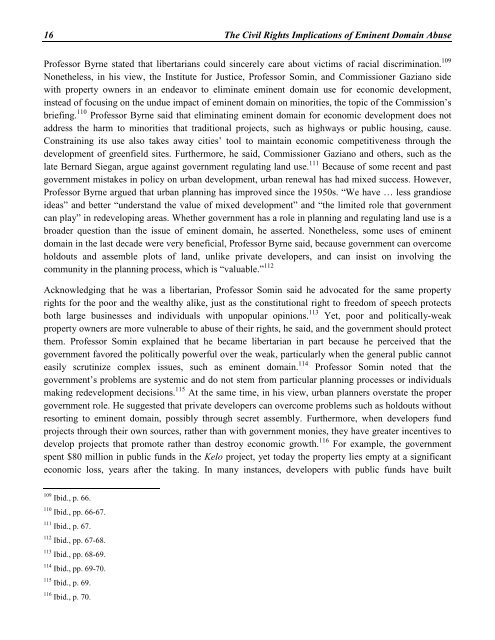Create successful ePaper yourself
Turn your PDF publications into a flip-book with our unique Google optimized e-Paper software.
16 The Civil Rights Implications of <strong>Eminent</strong> <strong>Domain</strong> AbuseProfessor Byrne stated that libertarians could sincerely care about victims of racial discrimination. 109Nonetheless, in his view, the Institute for Justice, Professor Somin, and Commissioner Gaziano sidewith property owners in an endeavor to eliminate eminent domain use for economic development,instead of focusing on the undue impact of eminent domain on minorities, the topic of the Commission’sbriefing. 110 Professor Byrne said that eliminating eminent domain for economic development does notaddress the harm to minorities that traditional projects, such as highways or public housing, cause.Constraining its use also takes away cities’ tool to maintain economic competitiveness through thedevelopment of greenfield sites. Furthermore, he said, Commissioner Gaziano and others, such as thelate Bernard Siegan, argue against government regulating land use. 111 Because of some recent and pastgovernment mistakes in policy on urban development, urban renewal has had mixed success. However,Professor Byrne argued that urban planning has improved since the 1950s. “We have … less grandioseideas” and better “understand the value of mixed development” and “the limited role that governmentcan play” in redeveloping areas. Whether government has a role in planning and regulating land use is abroader question than the issue of eminent domain, he asserted. Nonetheless, some uses of eminentdomain in the last decade were very beneficial, Professor Byrne said, because government can overcomeholdouts and assemble plots of land, unlike private developers, and can insist on involving thecommunity in the planning process, which is “valuable.” 112Acknowledging that he was a libertarian, Professor Somin said he advocated for the same propertyrights for the poor and the wealthy alike, just as the constitutional right to freedom of speech protectsboth large businesses and individuals with unpopular opinions. 113 Yet, poor and politically-weakproperty owners are more vulnerable to abuse of their rights, he said, and the government should protectthem. Professor Somin explained that he became libertarian in part because he perceived that thegovernment favored the politically powerful over the weak, particularly when the general public cannoteasily scrutinize complex issues, such as eminent domain. 114 Professor Somin noted that thegovernment’s problems are systemic and do not stem from particular planning processes or individualsmaking redevelopment decisions. 115 At the same time, in his view, urban planners overstate the propergovernment role. He suggested that private developers can overcome problems such as holdouts withoutresorting to eminent domain, possibly through secret assembly. Furthermore, when developers fundprojects through their own sources, rather than with government monies, they have greater incentives todevelop projects that promote rather than destroy economic growth. 116 For example, the governmentspent $80 million in public funds in the Kelo project, yet today the property lies empty at a significanteconomic loss, years after the taking. In many instances, developers with public funds have built109 Ibid., p. 66.110 Ibid., pp. 66-67.111 Ibid., p. 67.112 Ibid., pp. 67-68.113 Ibid., pp. 68-69.114 Ibid., pp. 69-70.115 Ibid., p. 69.116 Ibid., p. 70.


